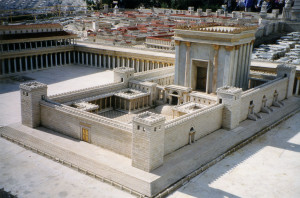As the Temples of God, how are believers to reflect God’s name?,the love of God
IT’S WORTH CONSIDERING
Throughout the Old Testament we find references to the Temple being the place where God’s name dwells. As King Solomon was dedicating the newly constructed Temple, he made it very clear that it was to be the earthly dwelling place for the name of God (See 2 Chron. 6:5-10, 20). It was understood that no earthly structure could actually house God, but yet His name was to be housed in this very special and holy place.
being the place where God’s name dwells. As King Solomon was dedicating the newly constructed Temple, he made it very clear that it was to be the earthly dwelling place for the name of God (See 2 Chron. 6:5-10, 20). It was understood that no earthly structure could actually house God, but yet His name was to be housed in this very special and holy place.
Understanding this concept is difficult for us Westerners because we have difficulty understanding the significance of name in Hebrew. We immediately think of the name by which a person is called. In Hebrew, however, one’s name means the nature, character, and personality of the person to the degree that it is known or revealed. For example, the Psalmist says, “Some boast of chariots and some of horses, but we will boast in the name of the Lord our God” (Psalm 20:7). This does not mean that in difficult times the Psalmist will remember that God is called Jehovah. What it means is that in difficult times some will trust in human resources and weapons. The Psalmist, however, will gain confidence as he calls to mind the nature and character of God.
AS I SEE IT
This understanding takes on even greater meaning when we remember that true followers of Christ are the modern day temples of God (See 1 Cor. 3:16). This means that we are to be holy repositories for the very nature, character, and personality of God. Stop and let that sink in. We are to be reflections of the character and nature of the Living God. Sadly, too often we reflect quite a different image. God has given us all we need to perfectly reflect Him. I believe Daniel understood this and serves as an example of a life dedicated to reflecting the “name of God” in every situation, no matter how difficult. Remember that he lived before the Holy Spirit had been sent to indwell God’s true children, yet he remained faithful to the end.
of God (See 1 Cor. 3:16). This means that we are to be holy repositories for the very nature, character, and personality of God. Stop and let that sink in. We are to be reflections of the character and nature of the Living God. Sadly, too often we reflect quite a different image. God has given us all we need to perfectly reflect Him. I believe Daniel understood this and serves as an example of a life dedicated to reflecting the “name of God” in every situation, no matter how difficult. Remember that he lived before the Holy Spirit had been sent to indwell God’s true children, yet he remained faithful to the end.
 One example comes to mind that shows how high the bar is as we attempt to reflect the “name of God.” I recently finished a very in-depth study of the book of John. All the members of our study group were to list the top five things that we learned from our nearly two-year study. Number one on my list came from the scene of the Last Supper when Jesus was making His final appeal to Judas. William Barclay, my favorite Bible commentator (except for a few “blind spots”), offers some incredible insight as to how Jesus reacted to what Judas was about to do. Jesus knew He was about to be betrayed and deserted. He could have turned bitter and resentful, but instead He loved more, giving Judas one last opportunity to change his mind.
One example comes to mind that shows how high the bar is as we attempt to reflect the “name of God.” I recently finished a very in-depth study of the book of John. All the members of our study group were to list the top five things that we learned from our nearly two-year study. Number one on my list came from the scene of the Last Supper when Jesus was making His final appeal to Judas. William Barclay, my favorite Bible commentator (except for a few “blind spots”), offers some incredible insight as to how Jesus reacted to what Judas was about to do. Jesus knew He was about to be betrayed and deserted. He could have turned bitter and resentful, but instead He loved more, giving Judas one last opportunity to change his mind.
The astounding thing was that the more men hurt him, the more Jesus loved them. When Jesus experienced the greatest injury and the supreme disloyalty, He responded with the greatest humility and the supreme love. He responds the same way to us. When our actions are the ugliest, He sees us as being in our greatest hour of need. It is then that He offers His greatest love, not because we deserve it, but because we need it then more than ever.
This insight reflects the unwavering love of God that seeks the best for others regardless of the cost to us. Jesus has indeed set the bar very high, but His divine power has granted to us everything pertaining to life and godliness, through the true knowledge of Him who called us by His own glory and excellence (2 Peter 1:3). For the New Year, may it be our heart-felt prayer that as His temples, we would learn to seek the best for others as we reflect the name of God to a lost world.
for others regardless of the cost to us. Jesus has indeed set the bar very high, but His divine power has granted to us everything pertaining to life and godliness, through the true knowledge of Him who called us by His own glory and excellence (2 Peter 1:3). For the New Year, may it be our heart-felt prayer that as His temples, we would learn to seek the best for others as we reflect the name of God to a lost world.





Leave A Comment